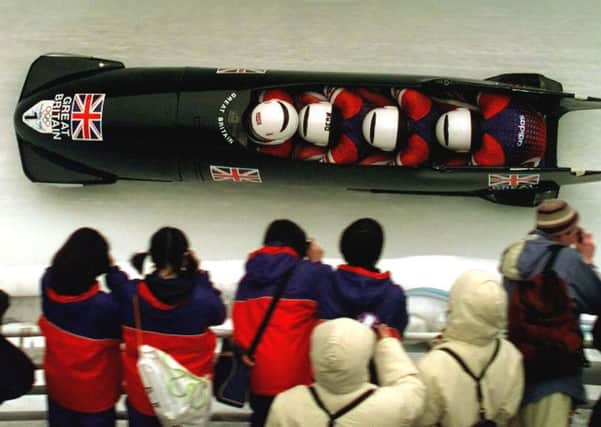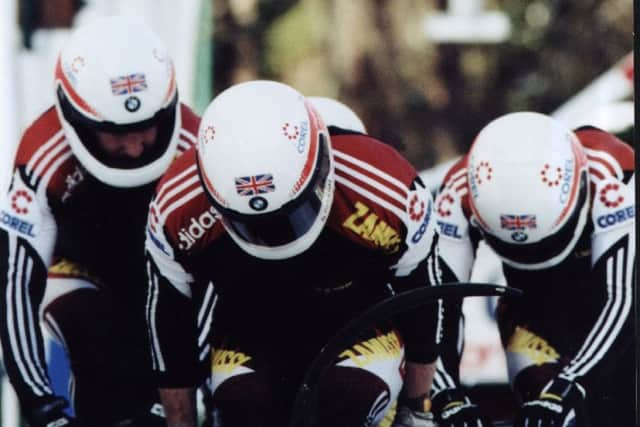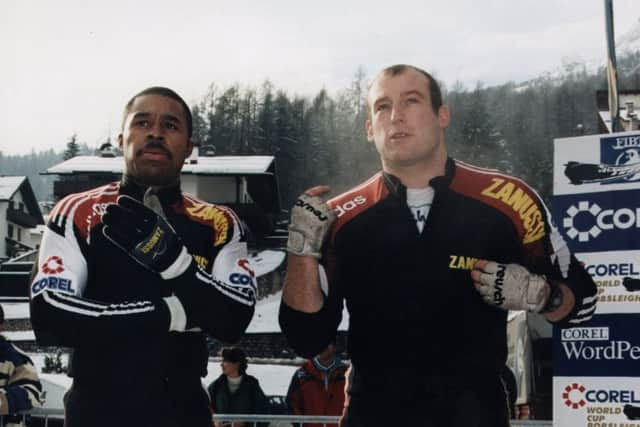Bygones: How freezing out Christmas saw GB grab historic Nagano bronze


Bobsleigh is a sport that takes that to a whole new level.
Just ask Sean Olsson, the last Yorkshireman to grace a podium at the Winter Olympics.
For Olsson, the events of Nagano 1998 will forever be etched in his memory.


Advertisement
Hide AdAdvertisement
Hide AdOlsson was No 1 in Great Britain’s four-man team 20 years ago this month.
The event was the pinnacle of Beverley-born Olsson’s career as he and his colleagues secured third place – the country’s first boblseigh medal since 1964.
But it was the slimmest of margins that proved the difference between going home empty-handed and leaving Japan with a bronze medal around their necks.
The quartet of Olsson, Dean Ward, Paul Attwood and Courtney Rumbolt had made a fine start to the event on day one, with their first run of 52.77 seconds seeing them sit proudly at the top of the leaderboard.


Advertisement
Hide AdAdvertisement
Hide AdBut then the inclement weather arrived, meaning the event was cut down from four runs to three.
Speaking to The Yorkshire Post, Olsson said: “The event should have been over four runs but because of extreme, torrential rain it meant the last run on the first day was cancelled.
“Overnight, we were actually in the gold position.
“We went home, regrouped and approached the track the next day .


“If things weren’t tough enough, with one run to go there were three of us tied to the exact same time “
Advertisement
Hide AdAdvertisement
Hide AdIndeed, with one run remaining GB, Switzerland and France were locked in a three-way battle with only two medals up for grabs.
This, though, is where Olsson, who at the time was a serving soldier in the Parachute Regiment of the British Army, dug deep and used his mental toughness.
He said: “I put a lot of hours into the mental strength side of things and employed a martial arts expert to help me with this.


“It was all about overcoming weaknesses through strength of mind.
“I needed my mind to control immense pressure.
“Thankfully my last run was perfect and it had to be.
Advertisement
Hide AdAdvertisement
Hide Ad“Our sled came out of there lovely and clean and that’s all it took.
“It worked, even though the French came through with an outstanding run on their last run to tie with us.
“It was my third Olympics, having come 16th and then eighth in the previous Games.
“So I thought this was potentially my last and I’d worked for it my entire life.
Advertisement
Hide AdAdvertisement
Hide Ad“I was in the military at the time and everything was put on hold, including family, to go for that event.
“I spent 10 months away from home that year to prepare.
“The cost was quite a lot, in some respects, with family for example.
“But I’ll be honest, I wouldn’t change anything.”
Olsson admits the magnitude of just how slender the team’s victory was only dawned on him post-Nagano.
“For quite a while after the Games I did after-dinner speaking and carried with me a bag of stopwatches,” he continued.
Advertisement
Hide AdAdvertisement
Hide Ad“Between silver and fourth there was nine-hundredths of a second.
“When you try and do it on a watch, try and stop and start only then do you realise how quick that is.
“You could drive yourself crazy thinking where that time could have been won or lost.”
Olsson is a big believer in proper preparation and his meticulous planning was evident throughout the build-up to the Games.
Advertisement
Hide AdAdvertisement
Hide AdDespite having the chance to take some time off over Christmas he instead decided to probe the Nagano course first-hand while his peers were busy celebrating the festivities.
He said: “I had eight or nine days off the previous Christmas, so we went out there. We flew out, hired an old two-man bobsleigh and spent a week over Christmas just going up and down the track.
“Funnily enough, the only other guy doing the same thing was a guy called Pierre Lueders from Canada and he ended up getting the gold in the two-man event.
“So, you could argue that time off over our holiday period paid off because the two of us who did it brought medals home.
Advertisement
Hide AdAdvertisement
Hide Ad“What was unique about Nagano was that only when it was built did they realise that it was too fast.
“This is the only track in the world where there was a really steep grade uphill mid-course. This was absolutely essential to get right, so unless you got the perfect line you aided that deceleration.
“It’s a lovely track and it’s just a shame it’s not been used since. The track is still in existence to my knowledge but it’s never been used for a major event which is a pity because it is a fantastic track and I’ll always fondly remember it.”
After Nagano, Olsson did continue to compete but retired from professional competition in 2002 without having the chance to defend his medal in Salt Lake City.
Advertisement
Hide AdAdvertisement
Hide AdHe returned to the army before retiring in 2010 after completing 26 years of service.
Now aged 50, he is still very much involved in the sport and his career has gone full circle as he now coaches the Army team and passes on the knowledge he garnered over those years to the next crop of budding sled stars.
Having the chance to teach the skills of the sport is something that Olsson clearly relishes.
A short spell coaching the GB women’s team at the 2010 Games in Vancouver didn’t appeal to him and instead he now enjoys the chance to give something back in a familiar setting of his.
Advertisement
Hide AdAdvertisement
Hide AdHe added: “Although I don’t race now, I get huge satisfaction passing on my knowledge to riders.
“It’s a big feeling to take a young soldier who has served in Iraq or Afghanistan and introduce them to a bobsleigh track and by the end of the week they are driving down it.
“I was lucky being in the military that these diverse, off-the-cuff sports became available.
“It was a friend of mine had a go at boblseigh and I fancied having a go at it purely because it was something different.
Advertisement
Hide AdAdvertisement
Hide Ad“I eventually progressed from the novice army team to the seniors and then the GB junior team and then the Olympic team steadily.
“I was the head coach for GB Ladies’ team in 2010 and if I’m totally honest, I didn’t enjoy it.
“It wasn’t fun. There was a lot of politics and pressure between the men’s and women’s teams. It wasn’t the experience that I thought or hoped it would have been be so I walked away from the international team.
“I now just do what I call the ‘fun’ stuff, and coach the military team. They look after me well and it’s a fine balance. I love the sport and I’m very happy to still be involved with it.”
GB again seen as underdogs in Pyeongchang
Advertisement
Hide AdAdvertisement
Hide AdSEAN OLSSON knows more than most that reputations and past records count for precious little when it comes to the Winter Olympics.
Twenty years ago Olsson led Team GB to an unlikely bronze medal in the four-man bobsleigh event.
Up against nations with superior facilities on their doorstep, Olsson and his colleagues showed determination and endeavour to seal a first British medal in the discipline in 34 years.
Now, the current British team head into their event in a similar spirits with pundits expecting them to return home empty-handed.
Advertisement
Hide AdAdvertisement
Hide AdOlsson said: “The Olympics is a unique event and my attitude going into 1998 was that anything can happen.
“They (Team GB) are probably the underdogs but they’ve proven over the last few years that they can be world class.
“It will come down to their mettle.
“But I would like them to do something and it would be good for the future of the sport.
“We are a non-winter nation competing against countries used to snow and ice – Germany has four boblseigh tracks for example.
“We are classed as a minor country in these sports, so for us to win anything will always be a huge achievement.”